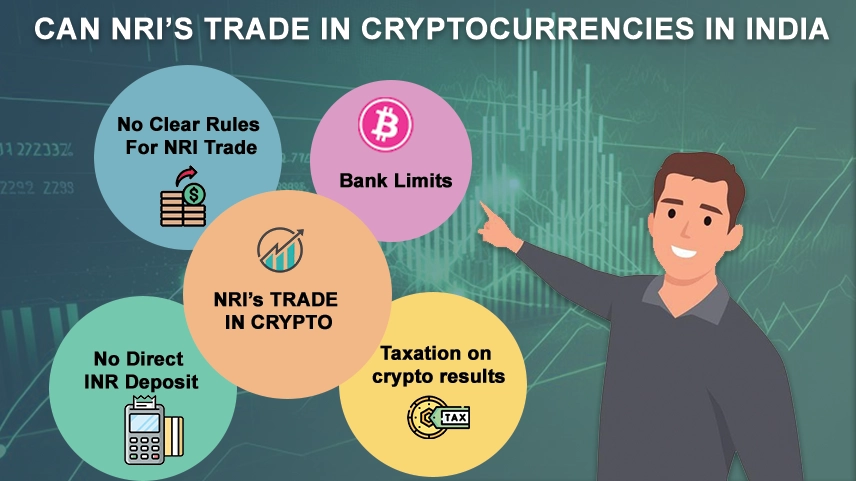Can NRIs Trade in Cryptocurrencies in India
Cryptocurrency Trading has gained popularity globally, and many non-resident Indians (NRIS) are interested in investing in digital assets. However, India's regulatory structure is complex around crypto trade, which requires understanding of validity before investing for NRIs.

Current Legal Status of Cryptocurrency in India
So far, cryptocurrency trade in India has not been banned in
India, but is not recognized as a legal tender. Reserve Bank of India (RBI) had
previously banned the crypto transactions, which was removed by the Supreme
Court in 2020. However, the government of India has introduced a tax policy for
crypto in India revenue, which indicates a regulated approach rather than a
ban.
Can NRIs Trade Cryptocurrencies in India?
NRIs face challenges when trading cryptocurrencies in India due to regulatory and banking restrictions. Here are key factors to consider:
1. No clear rules for NRI trade - India's government has clearly mentioned whether NRI can act cryptocurrency on Indian stock exchanges.
2. Bank limits - most Indian banks do not support Cryptocurrency transactions for NRIs due to the rules of the Currency Cost Act (FEMA).
3. No direct INR deposit -NRI RBI cannot finance Indian cryptout exchange accounts using the NR/NRA accounts according to guidelines.
4. Taxation on crypto results - If NRI earns at crypto trade in India, they will have to pay 30% tax on the profits in accordance with 2022 Crypto Taxation Policy.
Alternative Ways NRIs Can Invest in Crypto
Since Indian exchanges have restrictions, NRIs can explore
other ways to invest in cryptocurrencies:
- Foreign
Crypto Exchanges: NRIs can use international platforms like Binance,
Kraken, and Coinbase, which do not have Indian jurisdiction restrictions.
- Peer-to-Peer
(P2P) Trading: Some Indian crypto exchanges offer P2P options where
users can trade directly without involving banks.
- Investing
Through Foreign Bank Accounts: Nri Cryptocurrency can invest in crypto
through their resident country’s banking system, avoiding Indian
restrictions.
Things NRIs Should Keep in Mind
- Always
check tax implications in both India and the country of residence.
- Use
exchanges that comply with global KYC and AML regulations.
- Keep
track of regulatory updates, as crypto laws in India are still evolving.
Conclusion
While NRI can trade cryptocurrency, direct trade in Indian
stock exchanges is challenging due to regulatory restrictions. Investing
through global stock exchanges or foreign bank accounts is a better
alternative. When India is moving towards clear rules, NRIS should remain
updated to make informed investment decisions.
Read Also
Can an NRI do Intraday Trading in India
Can Nri Invest in Mutual Funds

0 comments